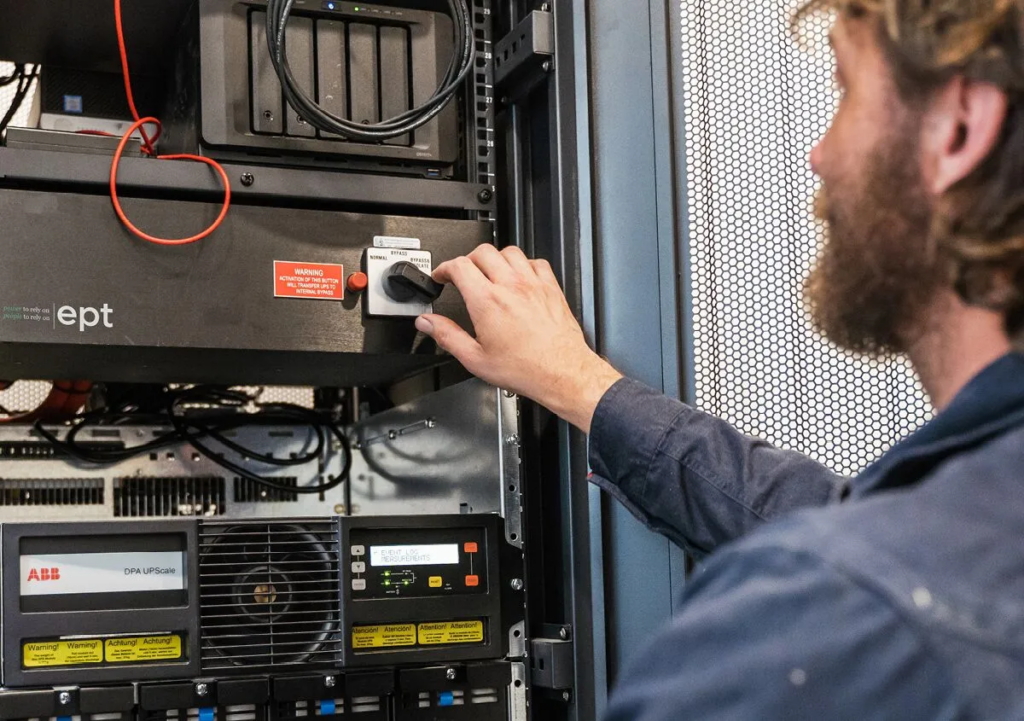A reliable Uninterruptible Power Supply (UPS) system is critical for protecting businesses from power outages, voltage fluctuations, and other disruptions. However, having a UPS system isn’t enough—it needs to be optimised to perform efficiently and effectively. This ensures not only the safety of your equipment but also cost-effectiveness and long-term sustainability.
What is a UPS System?
A UPS system is designed to provide backup power when the main electricity supply fails or fluctuates. Whether it’s for data centres, hospitals, or manufacturing facilities, a UPS system ensures that critical operations continue seamlessly. These systems can bridge the gap between a power outage and the activation of a backup generator, providing invaluable protection against data loss and downtime.
Why Optimisation Matters

An unoptimised UPS system can lead to higher operational costs, reduced efficiency, and increased risks of equipment failure. Let’s break down why optimisation is essential:
- Energy Efficiency
A well-optimised UPS system consumes less power, reducing electricity bills and environmental impact. Modern businesses are under pressure to adopt sustainable practices, and an efficient UPS system is a step in the right direction.
- Extended Equipment Lifespan
By optimising your UPS system, you reduce wear and tear on the batteries and other components. This not only ensures reliability but also delays the need for costly replacements.
- Improved Reliability
Power failures can be catastrophic for businesses relying on critical systems. Optimisation ensures the UPS system activates as expected, minimising downtime and protecting sensitive equipment.
- Cost Savings
Regular maintenance and performance tweaks prevent unnecessary energy consumption and reduce the likelihood of costly repairs or replacements.
Common UPS System Issues
Before diving into optimisation strategies, it’s essential to understand the common issues businesses face with UPS systems:
- Overloading
When a UPS system is overloaded, it struggles to perform efficiently, increasing the risk of failure during critical moments.
- Poor Maintenance
Skipping regular inspections can lead to degraded batteries, clogged air filters, and other problems that compromise the system’s reliability.
- Incorrect Sizing
A UPS system that isn’t the right size for the load it supports will either waste energy or fail to meet demand.
Strategies for Optimising UPS Systems
Here are a few ways that you can optimise your UPS system:
1. Regular Maintenance
Routine maintenance is the cornerstone of UPS optimisation. This includes inspecting batteries, checking connections, and testing system performance. Partnering with professional UPS services ensures issues are detected and resolved early.
2. Battery Management
Batteries are the heart of any UPS system. Proper management involves:
- Monitoring battery health and replacing them when necessary.
- Ensuring batteries are stored in optimal environmental conditions to prevent premature wear.
3. Load Balancing
Distributing the electrical load evenly across the system prevents overloading and maximises efficiency. Periodic reviews of load requirements can help identify imbalances and rectify them.
4. Upgrading Equipment
Technology advances rapidly, and older UPS systems may not be as efficient as newer models. Upgrading to a modern, energy-efficient system can provide significant long-term savings.
5. Remote Monitoring and Management
Implementing remote monitoring tools allows businesses to track the performance of their UPS systems in real time. This proactive approach helps identify potential issues before they escalate.
6. Professional Audits
Engage experts to conduct regular audits of your UPS system. They can assess the current setup, recommend improvements, and ensure compliance with industry standards.
The Role of UPS Services in Perth

For Australian businesses, particularly those in Perth, professional UPS services are invaluable. Providers like EPT specialise in:
- Conducting performance assessments to identify inefficiencies.
- Offering tailored maintenance plans to keep systems running smoothly.
- Advising on the best UPS models and configurations for specific industries.
With their expertise, businesses can optimise their UPS systems for peak performance, ensuring uninterrupted operations.
Benefits of Optimising UPS Systems
Optimising your UPS system brings a range of benefits that go beyond immediate cost savings:
- Enhanced Business Continuity
Downtime can be costly, both financially and reputationally. A reliable UPS system ensures operations continue uninterrupted, even during power disruptions.
- Compliance with Sustainability Goals
Many Australian businesses are working towards reducing their carbon footprint. An energy-efficient UPS system aligns with these goals by minimising electricity consumption.
- Peace of Mind
Knowing your system is optimised and reliable allows you to focus on core business activities without worrying about power issues.
Conclusion
Optimising your UPS system isn’t just a technical necessity—it’s a smart business decision. From reducing energy costs to improving reliability, the benefits are clear. Regular maintenance, proper battery management, and professional audits are just a few steps that ensure your system performs at its best.
If you’re in Perth, partnering with expert UPS service providers like EPT can make all the difference. Don’t wait for a power failure to realise the importance of optimisation—take action today to safeguard your operations and your bottom line.













